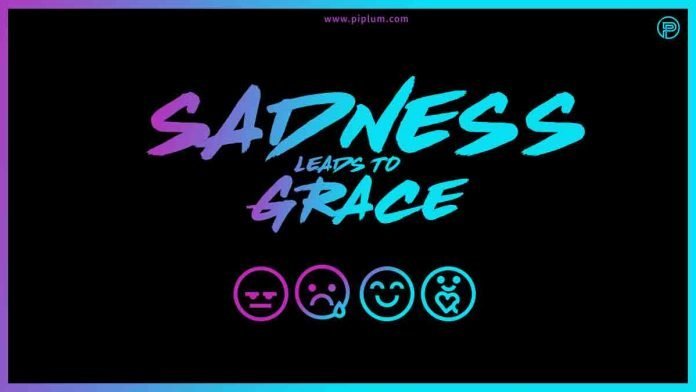
Grief; sorrow; heartache; heartbreak; melancholy; misery; mourning — Sadness is simply such a passing emotion or long-lasting feeling that leaves a specific spice in the throat, behind the eyes, in the chest, sometimes in the heart.
What is the purpose, and what does it tell us?
Sadness is not a pleasant feeling, and we usually avoid it whenever we can.
However, strange as it may seem, we often feel sadness in completely atypical situations, such as the approach of spring or during the holidays.
Let’s begin with the quote about sadness:
Pain leads to grace
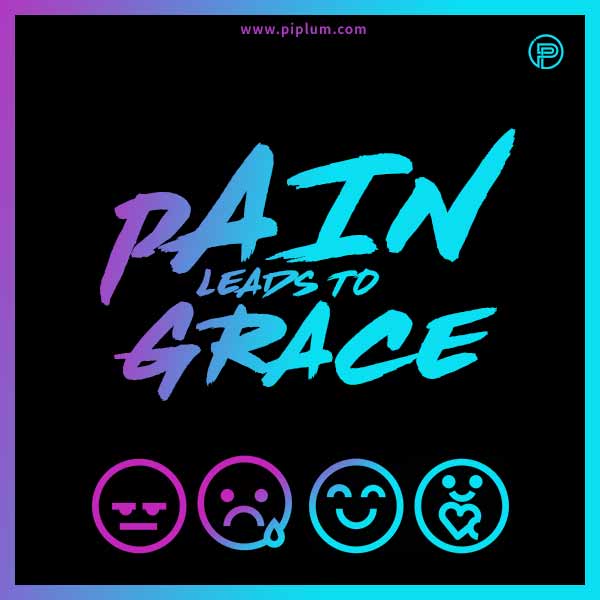
But why is that?
- Why sadness exists?
- What is its purpose?
- What does grief sadness do to us?
- And what can we do about it?
Is Sadness Hurting You? Or it’s just Your Own Expectations?
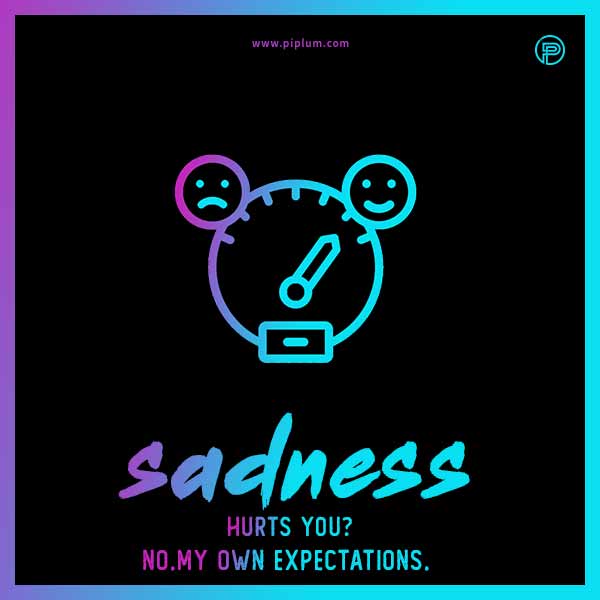
Sadness and its function
We would like to discuss the subject of sadness.
Sadness, which can primarily occur in circumstances that should not cause grief, such as a waking spring, more people on the streets. Or, for example, holidays are smaller or more prominent, but any holidays that can still make us sad.
The first thing to start with is that sadness is a normal feeling.
Sadness is familiar to all and, although we describe it as an unpleasant feeling, it is very much needed by man.
Sadness has its function, its purpose.
If we didn’t need it, we probably wouldn’t have it anymore, just like any other thing that has become useless in the course of evolution.
So sadness, as one of the feelings, also has a purpose, a function.
The best and most memorable quotes about sadness:
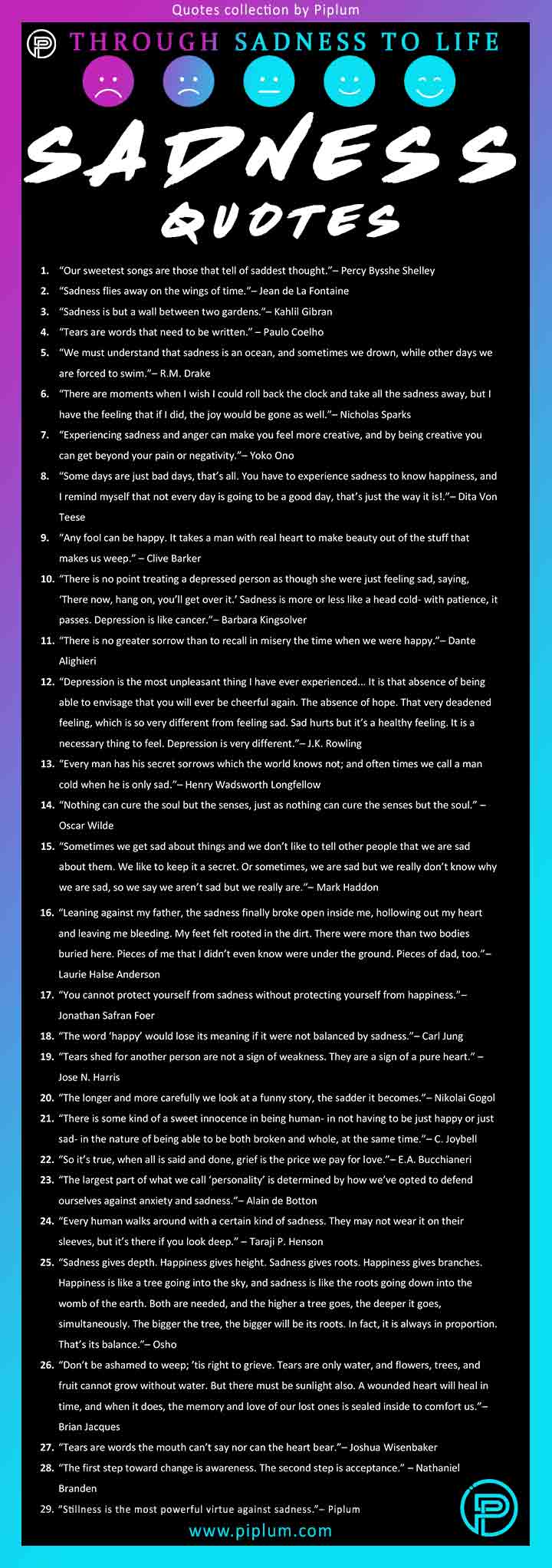
Desire or lack of something.
Its function is to show us that we are experiencing an inevitable shortage or have a desire. If we didn’t feel sad, we might not even think about it.
For example, you may sometimes feel lonely, but don’t always think about it and don’t do anything about it. But spring wakes up, you walk down the street and pass by with a couple smiling at each other. You are overwhelmed with sadness. This sadness reminds you of your desire to be in a relationship or perhaps the loss you have suffered, a divorce, or the like.
So grief tells you of a desire or scarcity that is present in your life right now.
You might like: Discover Inspirational Love Quotes. Spark Your Feelings And Start Living Again!
If you don’t get sad, you might not even think about it.
But noticing this alone is not a function of sadness.
The purpose of sorrow is also to encourage us to think about whether we want to do something.
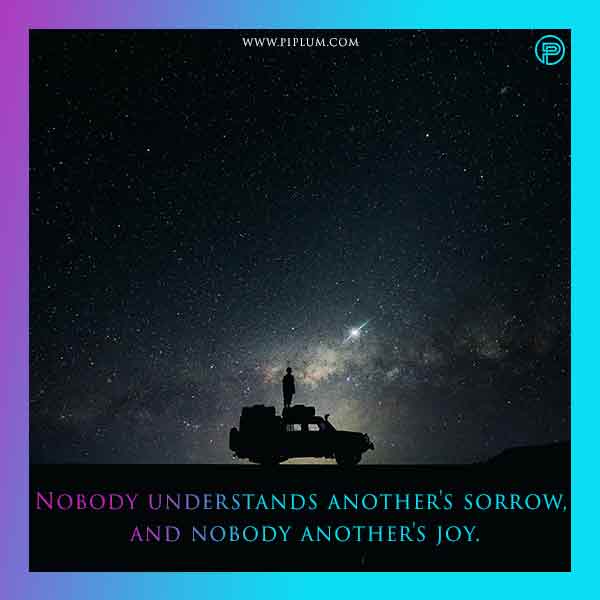
Perhaps sadness will then stimulate you to seek a solution. For example, if you feel lonely, you might try to meet more people, go out on the town more often, and build new relationships.
Or perhaps sadness will help you accept the fact of what the present is and come to terms with it if it is a unique situation, such as loss. You can’t bring it back and you can’t regain a lost relationship with a person, but you can accept that fact, stay with it, realize it, and then when you are upset and exhausted, you can look for a relationship and build it with new people.
If we do not allow ourselves to grieve and perish, it is as if we close the door to the desire we experience and remain unfulfilled. Or we are not filling the gap we are experiencing.
Why do we feel sad during the holidays?
So sadness is a fundamental feeling.
And if we feel sad, then it tells us something. So it’s worth asking that sadness or ourselves why we feel sad. Why can we also feel anxious during the holidays or when spring comes? It would seem as if it were a holiday, a gift, a lot of people on the streets or the weather is warming in the spring.
How to deal with sadness?
During the holidays, people enjoy a vibrant circle of friends and gorgeous gifts, but if we feel sad, it is worth asking ourselves what is saddening us. Maybe it’s that we’re lonely, and perhaps it’s that our financial situation is right now and we can’t provide such a plentiful table or such beautiful gifts. When we feel this sadness, we can think about whether we can continue to do something with it or replace it.
Can we look for people, for example, or should we accept this situation more and mourn it, no longer avoiding realizing our experience. I understand that you may no longer want to experience sadness, which is why people tend to run away from sorrow. It’s not a pleasant feeling.
It’s a massive, depressing feeling. But he is critical, and if we do not allow him to be, to manifest and feel him, we remain unaware and unacceptable of many things about ourselves and our lives. Then we don’t have the opportunity to change that and look for ways to improve our quality of life.
How to maintain a positive dialogue with yourself?
Everyone wants to be the best version of themselves, and that’s nothing wrong. It encourages us to improve in various planes and invariably leads us forward.
However, sometimes it can happen that we start to make too high demands on ourselves, start looking for harassment, judge ourselves, and condemn ourselves.
But what can we do to avoid being in front of ourselves? What could be the consequences? How to maintain a positive dialogue with yourself? And why is it worth doing at all?
What does our internal dialogue look like?
Let’s discuss one topic I’ve been thinking about for a long time that is infinitely important and interesting. Why it’s worth having a friendly dialogue with yourself.
I mean, we often tend to criticize ourselves – you probably catch yourself. We mourn ourselves for something, look for harassment in ourselves, we blame ourselves for something.
This means that quite often, our internal dialogue with ourselves becomes accusing or angry. So let’s talk about why it would still be worth having a friendlier conversation with yourself.
When it comes to the inner criticism we each have within ourselves, this inner critic can sometimes become very strong, criticizing virtually every step we take. This causes tension, we find ourselves in constant tension. We can also begin to set ourselves very high requirements, high expectations that are not even possible to meet or meet.
For example, we make demands on ourselves to complete a task that requires more time in a very short time. We then begin to criticize ourselves for not being able to accomplish this task, calling ourselves incompetent, undisciplined, involuntary.
Setting expectations for ourselves that we cannot meet is a straight path to self-esteem. It condemns us to disappointment in ourselves.
Communication difficulties
Another important thing is that when we continuously rebuke ourselves and get angry at ourselves, we no longer allow ourselves to notice our good qualities and abilities, and we can no longer rejoice in our tremendous or smaller achievements.
We can no longer even assess this as an achievement. Then it can also become a constant self-blame or criticism, self-frustration. This again condemns us to self-underestimation and belittling.
Also, when we belittle and criticize ourselves, it can strain our relationships with those around us. It can become challenging to communicate with people.
Because we belittle and criticize ourselves, we no longer want to deliver and show ourselves to others. Speaking to others, the inner critic is again looking for something to cling to. Maybe we didn’t say or do something like that, perhaps we had to keep quiet, we had to say something louder or something different.
After all, it is so stressful that we may decide that we are unexpected interlocutors in general, we should avoid communication, we do not have communication skills, we can blame ourselves in every way and prevent disclosure.
Where can all this push? This can lead to alienation – we want to avoid people because we are unable to communicate, we start to avoid challenges at work because we are unlikely to succeed. We are afraid to take on new activities because nothing will work out.
Of course, doing something for the first time may fail, and that is normal, but an internal critic can then tell us that it is normal for others but not for us. We must succeed first. Then you have to disappoint yourself again.
How should you talk to yourself?
On the other hand, maintaining a friendlier and more positive dialogue with ourselves would mean encouraging ourselves: if something has failed, it does not mean that we are losers, we have been unable only this time, and now we know what we should do differently.
If we feel we have done something or said something wrong, we can support ourselves or remind us more friendly. We may find that, in general, we all too often criticize ourselves for petty things that are not worth criticizing ourselves for.
One can also think about what we do if the person we know is sad or crying. Are we attacking him because of that? Do we believe he was unlucky because he was weak or incompetent?
You’ll probably try to comfort him, say that failure doesn’t mean he’s worth anything as a person or that his whole life has failed, or that he’s doing absolutely everything wrong because you know it’s not true.
So, as if we were talking to a sad or crying person, it is sometimes worth trying to adapt to the internal dialogue.
Healthy adult status. How to achieve it?
Even though we’ve been growing up for a long time, we’d often really want to be those powerful and healthy adults instead of still feeling powerless children out of control of their lives.
But what is this state of a healthy adult? When does she visit us? How does it manifest itself? How does it benefit us? And how to achieve it?
The state of a healthy adult is an objective and logical look at yourself
A healthy adult is that part of our personality where we are the best, the smartest, and can make the best decisions. So at first, I suggest you remember when you felt free and at the same time healthy and safe. Think. Because often, when people remember it, they remember when they felt safe, but at the time, they were kind of not intense. And a healthy adult is when you feel safe and also feel secure.
When we are in the state of a healthy adult, we are not like a Buddha, but like some kind of master who looks at other moods, other parts of his personality with a sensible, objective view. In this way, we can build a bridge between ourselves and the situation. We understand what to do to act in the best way for our needs in that situation. Or what to do to meet my needs, but the other person would also be satisfied.
It is such a calm reaction to your problems.
Motivate, not criticize
The person can then be stable, defensive, and, most importantly, that the state of a healthy adult is different from that of an inner critic. In this state, we motivate ourselves, not criticize ourselves. We learn from mistakes and motivate ourselves. It’s like soaring between all your moods. We are very logical at the time, but at the same time we can feel our feelings, we can take care of our childish parts, we can limit our impulsivity if we tend not to do something or get nervous.
Clearly, it should be defined when this state of healthy adulthood usually turns on us. For example, when we talk to a smart person. Or when we take responsibility – we make and do what we planned ourselves. Or we take and correct something, explain something to someone. Of course, we can remember when we felt that way, and we can also not forget some hero who, in our eyes, is also healthy, reliable, and adult.
Worth remembering
However, it is best to remember this state when we are dealing with complicated feelings. Remember that moment and what you did to get it right. Then we can even sit on a chair as if we were stable and mature. And we can sit crushed like children or shrunk from the reproaches of an inner critic. Sometimes it’s even worth telling yourself that you’ll take and pretend you’re healthy and adult and think about what solution would seem right for you at the time from the situation you’re in now.
Or what advice would you give to another person in your place? When we think of someone other than ourselves, we move back to a state of healthy adulthood.
How is sadness different from depression?
Sadly, we realize that we or the world is missing something, but we react vividly to the world and keep our desires.
We sleep, eat, and maintain libido and interests.
We can quickly start crying when we are sad.
When weep, the tension of sadness is reduced, and it is relieved for us.
When we are depressed, we feel as if it is not an emotion, but a lack of emotions, or feelings remain, aggressive intentions prevail: anger, guilt, suicidal ideation.
Sometimes unbearable tension, depression is felt.
Depressed realism is characteristic: we do not idealize the world, and quite soberly, we notice that there are bad things next to the good (usually we see the world a little through pink glasses).
We become apathetic: not so much the world as we begin to lack vitality, desires, aspirations (“I have the same …”).
We become entangled, suppressed, and unable to cry.
We no longer want to eat or, conversely, we devour; we cannot sleep, the need for sex disappears, we abandon hobbies.
You might like this article: Face Sadness With A Smile. Positive Coronavirus Quotes. Stay Inspired!
